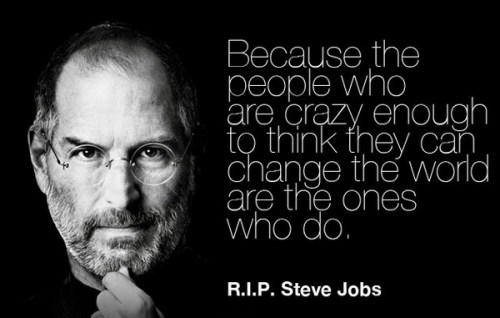What the movie “Jobs” tells you about being an entrepreneur
By Elliot Roth
I went to see “Jobs” the other day with some friends and was thoroughly entertained. Ashton Kutcher’s acting was spot-on, with an excellent appearance from Josh Gad as Woz, who acted as Jobs’ conscience for most of the movie. I’m not sure whether Woz agreed with the performance, but it definitely tugged at my heartstrings.
The film was very Hollywood, with plenty of inaccuracies , but still gave some important lessons about entrepreneurship and starting a company:
1. Find the oddballs with the crazy ideas
From the very beginning of the movie, you can tell that Steve Jobs was a bit different. He dropped acid, cheated on his girlfriend, went to India, and sat-in on college courses without paying. Not only was Jobs different, but he gravitated to others who were strange, others with obsessions. You could label them as “geeks” but it’s more about having a single-minded determination and focus.
[youtube=http://www.youtube.com/watch?v=nmwXdGm89Tk&w=420&h=315]
For example, Woz was a member of the Homebrew Computer Club, a fringe group of electrical hobbyists that believed in the social power of computers to connect and enable humanity. Back then, that idea sounded crazy, but this fringe group had the skill and knowledge to make it possible.
If you are an aspiring entrepreneur, but have no marketable skills, go to your local DIY meeting or Makerspace. You can learn something new, and find co-founders who may want to partner with you to bring their idea to life. Also, these groups may contain some of your first customers.
2. Customer first
Apple had its first customer before it was even a company. Paul Terrell ran a small computer parts store in the Valley and agreed to retail the Apple I. Jobs and Woz were in way over their heads before they even started. They needed to ship 50 boards in two months. They didn’t have the parts, they didn’t have the labor, and the prototype still needed some work. It was do or die.
The story of Steve and Woz’s first customer illustrates that you can never be ready for starting a business; you must constantly adapt and hustle to get things done. Their first customer also taught them some essential lessons for the future.
3. Oversell and over deliver
In the movie, Jobs is approached by Paul Terrell who still wants to buy the Apple I after a fumbling presentation. Jobs immediately begins underselling by saying that there are others interested in the Apple I (in truth there were none), but he’d stop by the shop. He walks into the shop the next day and immediately begins bargaining with such confidence that Terrell is taken aback and agrees to a large sale.
This salesmanship is repeated again when Mike Markkula comes to invest. Steve is quick and never loses his cool in the face of defeat or success. He renegotiates the contract to better benefit Apple and shows that Markkula isn’t dealing with amateurs.
What “Jobs” doesn’t show is the amount of behind-the-scenes research that goes into those snappy sales. By knowing the industry, and finance, you can make investments and sales work to your benefit. Steve knew that he needed some money in advance in order to build the Apple I. He worked out the pricing beforehand and oversold the computer to make a profit.
The last thing any entrepreneur should do is give up equity in your company. Steve knew that at a $300,000 evaluation, $90,000 is less than 1/3 of the company. At a certain point, it was this lack of control that ended Steve’s position at Apple. This happens over and over again to founders so be ready for it. Be indispensable to your company.
Overselling is nothing without delivering. Jobs delivered 50 motherboards to Terrell who immediately critiqued how they weren’t packaged products. Jobs countered by saying that Terrell could move more inventory by selling to hobbyists because he had all the components in shop, therefore he could make money. Without that quick counter, Apple would have ended as soon as it started. They under-delivered to their first customer. Terrell had taught them a lesson: customers only care about the final product and how simple and accessible it is to use.
4. Hiring is your worst mistake
There were two hiring mistakes in the movie. The first came from Steve’s best friend, Daniel Kottke. When hiring, there are numerous things to consider. The first is if new hires can create value for the company, the second is if they mesh with the team, the third is if they can adapt and learn, and the fourth is if they share the same values as the company. The movie portrayed that Kottke was only friends with Jobs and lacked the skills to adapt as Apple grew. Although the movie took some liberties, the story is generally true.
The second hiring mistake was John Sculley, the former CEO of Pepsi-Cola and a proclaimed “marketing-genius.” Seeking to augment Apple’s marketing department, Jobs hired Sculley, who had great success with Pepsi’s brand in the late 70s. Sculley did not directly fire Jobs, but let the board axe him after the Lisa failed and the Mac did not produce the numbers they expected. Sculley was more focused on immediate gratification and revenue rather than long-term outcomes. When picking a CEO, you not only need someone who is a good executor, but someone who aligns with the core ideals of the company. Sculley bent to the will of the board instead of embracing the ideals of “thinking different.”
5. Relationships or business. Choose one.
A recent article caused an uproar among the entrepreneurial community. In it, the author states that entrepreneurs cannot have relationships. Steve Jobs is a perfect example of this. In the movie, he left his pregnant girlfriend and disregarded former friends, all in the pursuit of Apple. A start-up takes up your attention and, in order to be successful, you need perseverance in order to make your idea come to fruition. Relationships may pose as distractions when there are one-hundred-hour work weeks. That is why it is much easier to start a business when you are young. You have the energy and limited attachments; you can afford to be thrifty and frugal without others to count on you.
If you ever become a CEO, it will become even more difficult. Many founders are divorced because their startup is all-consuming. A relationship is a balancing act that is very difficult to keep steady during the tumultuous first months of a start-up. Also, if friends are working in your company, your relationship is fundamentally changed. It’s lonely at the top, and emotions cannot cloud decisions made for the good of the company.
6. Heart over talent
Emotions run high at many points in “Jobs.” The love that he poured into Apple is felt throughout the movie. Steve was the company, the company was Steve. Without that love of the values that Apple espoused, there would be no Mac, iPod, or iPhone.
There is a scene in the movie where Steve goes around recruiting for the Mac team. He seeks out not the technical best, but the ones who really care. The team goes on tours of art museums, nature walks, and works with determination and attention to detail because the product is an extension of themselves. The Mac team is an example of how a group can transcend the sum of its parts to become something truly incredible.
7. Every detail matters
Let me repeat that. Every. Detail. Matters. It is not the overall product that the customer remembers, but the little experiences that go with it. The Mac team had this incorporated in its DNA. Only take projects at which that you can excel. Always produce terrific work. This means that you should say no to 99% of the things that come to you. For that 1%, hit it out of the park by crafting delightful user experiences that change the way people interact with the world.
The first thing that Steve Jobs did when he returned to Apple as CEO is to cut all the projects that weren’t innovating. They were the projects that were clones of what other companies were doing, projects that were focused on product, not user experience.
One of the first lessons to learn as an entrepreneur is to start a business because it is different. The second is to build experiences into your designs so customers always come back.
8. Go for needs not sales
“You can’t just ask customers what they want and then try to give that to them. By the time you get it built, they’ll want something new.” ~S.J.
Steve led his company like Wayne Gretzky, always going to the open spot, where the next big play was going to be. The Mac was years ahead of its time. The iPod revolutionized the music industry. I’m not even going to talk about the repercussions of the iPhone.
Jobs excelled in his ability to find the need of the customer, the root of the problem, the “pain point.” He then created with simplicity in mind, taking from Braun designer Dieter Rams to make a blank canvas for customers to interact with and imbue personality into. Apple’s products are beautiful because that is what users needed even before they knew they needed it. This attention to need has enabled Apple to develop products that are years ahead of its time and to rightfully hold the spot as the number one computer company in the world.
9. Absolute focus and adaptability
It’s a long way to the top. The only way to get there is with unyielding drive. Steve was a very direct person. He got straight to the point and wasn’t afraid to cut through bullshit. As Woz said: “Steve doesn’t like foreplay.” Jobs had a single-minded determination to carry out a project. He’d forgo relationships, food, and sleep in order to finish. Entrepreneurs would do well to take from his example.
Steve also had a diverse skill-set. He understood many things at a moderate level, which allowed him to communicate clearly and effectively with all sorts of people and employees. At different points he was an engineer, artist, manager, salesman, and advertiser. As an entrepreneur you must be able to learn quickly and do what ever job is necessary. Steve Jobs threw his entire being into his work and it showed.
—————————————————————————–
We can all take value from the life that Steve Jobs lived. His legacy lives on in Apple and in the numerous products he produced while working there. The film ends on the cusp of his success with the iPod, and shows the culmination of all the lessons he learned during his lifetime. I would recommend any aspiring entrepreneur to see the movie to discover how Apple became synonymous with innovation.
[youtube=http://www.youtube.com/watch?v=FrvkCS0ZGPU&w=560&h=315]
Elliot Roth is a Junior in Biomedical Engineering at Virginia Commonwealth University. His interests are myriad and include slam poetry, music, international jewel thievery, being an EMT, and writing incredible articles as a Student Ambassador. You can reach him at rothet@vcu.edu and follow him on twitter @rothet.


